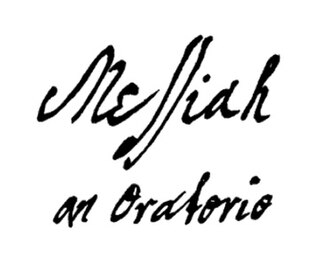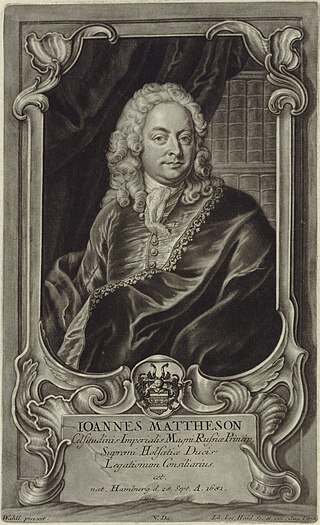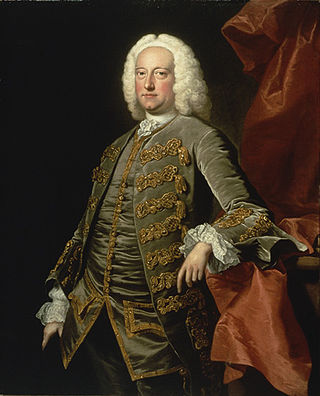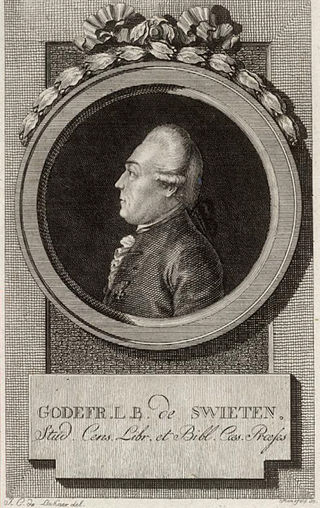
George FridericHandel was a German-British Baroque composer well-known for his operas, oratorios, anthems, concerti grossi, and organ concertos. Handel received his training in Halle and worked as a composer in Hamburg and Italy before settling in London in 1712, where he spent the bulk of his career and became a naturalised British subject in 1727. He was strongly influenced both by the middle-German polyphonic choral tradition and by composers of the Italian Baroque. In turn, Handel's music forms one of the peaks of the "high baroque" style, bringing Italian opera to its highest development, creating the genres of English oratorio and organ concerto, and introducing a new style into English church music. He is consistently recognized as one of the greatest composers of his age.
A countertenor (also contra tenor) is a type of classical male singing voice whose vocal range is equivalent to that of the female contralto or mezzo-soprano voice types, generally extending from around G3 to D5 or E5, although a sopranist (a specific kind of countertenor) may match the soprano's range of around C4 to C6. Countertenors often have tenor or baritone chest voices, but sing in falsetto or head voice much more often than they do in their chest voice.

Messiah is an English-language oratorio composed in 1741 by George Frideric Handel. The text was compiled from the King James Bible and the Coverdale Psalter by Charles Jennens. It was first performed in Dublin on 13 April 1742 and received its London premiere a year later. After an initially modest public reception, the oratorio gained in popularity, eventually becoming one of the best-known and most frequently performed choral works in Western music.

Johann Mattheson was a German composer, critic, lexicographer and music theorist. His writings on the late Baroque and early Classical period were highly influential, specifically, "his biographical and theoretical works were widely disseminated and served as the source for all subsequent lexicographers and historians".

Agrippina is an opera seria in three acts by George Frideric Handel with a libretto by Cardinal Vincenzo Grimani. Composed for the 1709–10 Venice Carnevale season, the opera tells the story of Agrippina, the mother of Nero, as she plots the downfall of the Roman Emperor Claudius and the installation of her son as emperor. Grimani's libretto, considered one of the best that Handel set, is an "anti-heroic satirical comedy", full of topical political allusions. Some analysts believe that it reflects Grimani's political and diplomatic rivalry with Pope Clement XI.

Classical music of the United Kingdom is taken in this article to mean classical music in the sense elsewhere defined, of formally composed and written music of chamber, concert and church type as distinct from popular, traditional, or folk music. The term in this sense emerged in the early 19th century, not long after the United Kingdom of Great Britain and Ireland came into existence in 1801. Composed music in these islands can be traced in musical notation back to the 13th century, with earlier origins. It has never existed in isolation from European music, but has often developed in distinctively insular ways within an international framework. Inheriting the European classical forms of the 18th century, patronage and the academy and university establishment of musical performance and training in the United Kingdom during the 19th century saw a great expansion. Similar developments occurred in the other expanding states of Europe and their empires. Within this international growth the traditions of composition and performance centred in the United Kingdom, including the various cultural strands drawn from its different provinces, have continued to evolve in distinctive ways through the work of many famous composers.

Charles Jennens was an English landowner and patron of the arts. As a friend of Handel, he helped author the libretti of several of his oratorios, most notably Messiah.

Jochen Kowalski is a German alto or mezzo countertenor, noted for his very rich timbre.

Solomon, HWV 67, is an oratorio by George Frideric Handel. The anonymous libretto – currently thought to have been penned by the English Jewish poet/playwright Moses Mendes (d.1758) – is based on the biblical stories of the wise king Solomon from the First Book of Kings and the Second Book of Chronicles, with additional material from Antiquities of the Jews by ancient historian Flavius Josephus. The music was composed between 5 May and 13 June 1748, and the first performance took place on 17 March 1749, with Caterina Galli in the title role at the Covent Garden Theatre in London, where it had two further performances. Handel revived the work in 1759.
William Savage was an English composer, organist, and singer of the 18th century. He sang as a boy treble and alto, a countertenor, and as a bass. He is best remembered for his association with the composer George Frideric Handel, in whose oratorios Savage sang.

Joshua is an oratorio by George Frideric Handel. It was composed in a month, from 19 July 1747 to 19 August 1747, six months before the beginning of the oratorio season. Joshua is Handel's fourth oratorio based on a libretto by Thomas Morell. The oratorio premiered on 9 March 1748 at the Covent Garden Theatre, London. Joshua is based on the Biblical story of Joshua as the leader of the ancient Israelites. The story follows the Israelites from their passage over the Jordan River into Caanan and through the Battle of Jericho. The work also includes a love story elaborated from a few hints in the Biblical narrative between Caleb's daughter Achsah and Othniel, a young soldier.

An Occasional Oratorio is an oratorio by George Frideric Handel, based upon a libretto by Newburgh Hamilton after the poetry of John Milton and Edmund Spenser. The work was written in the midst of the Jacobite rising of 1745–1746, the attempt to overthrow Handel's patrons – the Hanoverian monarchy under George II – and replace them with a Stuart restoration under Charles Edward Stuart, "Bonnie Prince Charlie". The Occasional Oratorio is unique among Handel's works which he labelled "oratorio" in that it does not tell a story or contain elements of a drama, but was intended as a defiant and patriotic rallying piece.

The Brockes Passion, or Der für die Sünde der Welt gemarterte und sterbende Jesus, is a German oratorio, libretto by Barthold Heinrich Brockes, first published in 1712 and seeing 30 or so more editions over the following 15 years.

Gideon is an oratorio pastiche compiled largely from the works of George Frideric Handel by John Christopher Smith. It was first performed on 10 February 1769 at Covent Garden, London.
Cecilia Young was one of the greatest English sopranos of the eighteenth century, the wife of composer Thomas Arne, and the mother of composer Michael Arne. According to the music historian Charles Burney, she had "a good natural voice and a fine shake [and] had been so well taught, that her style of singing was infinitely superior to that of any other English woman of her time". She was part of a well-known English family of musicians that included several professional singers and organists. Young enjoyed a large amount of success through her close association with George Frideric Handel. She appeared in several of his oratorios and operas including the premieres of Ariodante (1735), Alcina (1735), Alexander's Feast (1736) and Saul (1739).

Ero e Leandro, also known after its first line as Qual ti reveggio, oh Dio, is a 1707 Italian-language cantata by George Frideric Handel, composed during his stay in Rome to a libretto believed to be written by Cardinal Pietro Ottoboni. It is a reworking of the Greek myth of Hero and Leander, with the soprano soloist taking the role of Hero. In it, Hero finds her love, Leander, drowned, tears out her hair, thus symbolically rejecting the beauty which had led to Leander's fascination with her, then drowns herself. It is composed for a soprano solo, and a small orchestra consisting of two oboes, and two string sections: a concertino of solo violin and violoncello, and a concerto grosso made up of two violins, a viola, and continuo. In Ero e Leandro, Recitatives alternate with arias, as was normal at the period for not only cantatas, but oratorios and operas as well; however, unusually, Ero e Leandro ends with a recitative, instead of an aria.

The Handel organ concertos, Op. 4, HWV 289–294, are six organ concertos for chamber organ and orchestra composed by George Frideric Handel in London between 1735 and 1736 and published in 1738 by the printing company of John Walsh. Written as interludes in performances of oratorios in Covent Garden, they were the first works of their kind for this combination of instruments and served as a model for later composers.
Caterina Galli was an Italian operatic mezzo-soprano. She first rose to fame in England in the 1740s and early 1750s where she was particularly admired for her performances in the works of George Frideric Handel. She then enjoyed success in her native country in the 1750s and 1760s, before returning to England, where she remained active as a performer up through 1797.

Der Messias, K. 572, is Wolfgang Amadeus Mozart's 1789 German-language version of Messiah, George Frideric Handel's 1741 oratorio. On the initiative of Gottfried van Swieten, Mozart adapted Handel's work for performances in Vienna.
Graham Pushee is an Australian countertenor. Together with the Australian Brandenburg Orchestra, conducted by Paul Dyer, Pushee was nominated for the 1995 ARIA Award for Best Classical Album for the album Handel: Arias.









